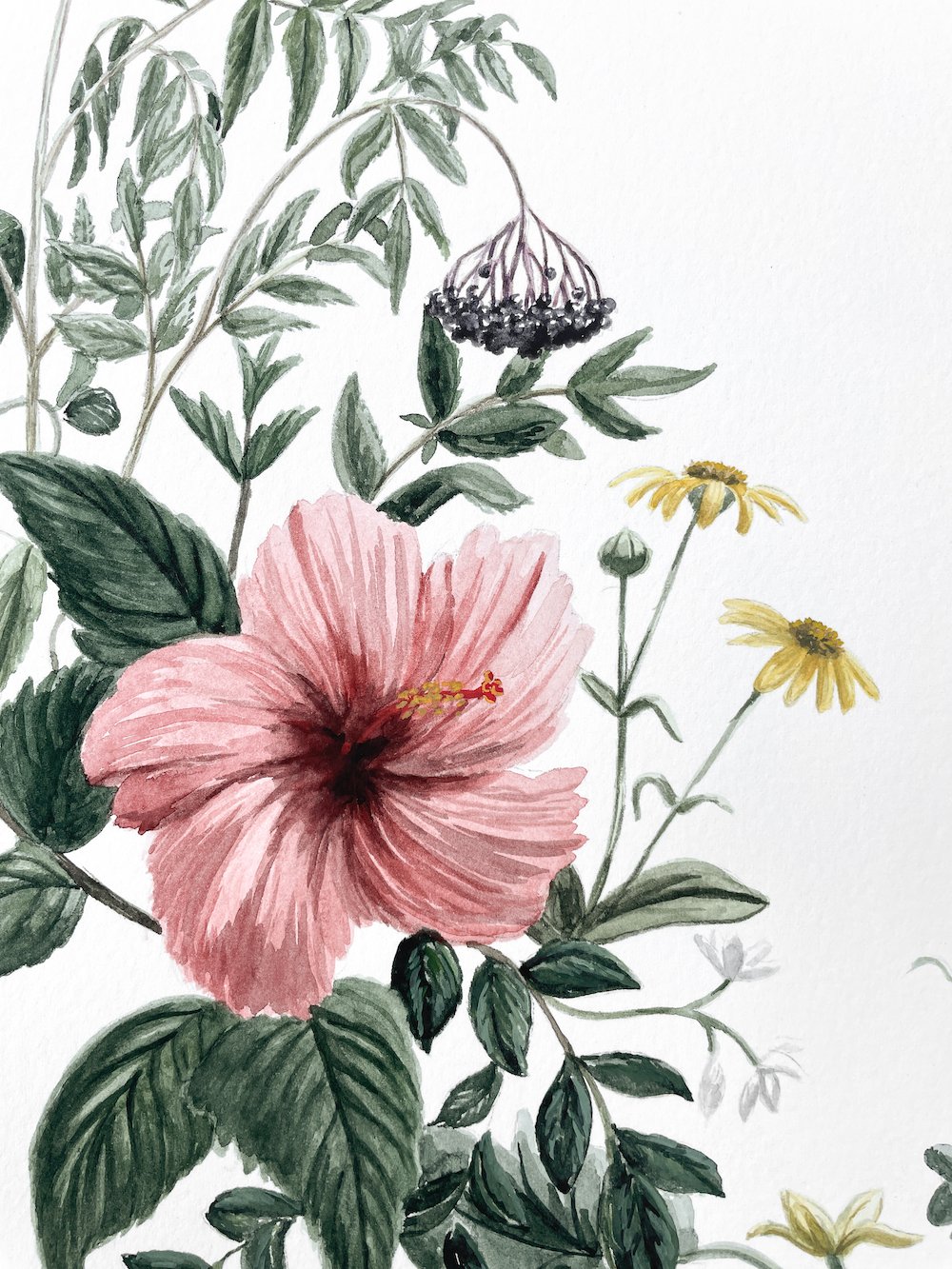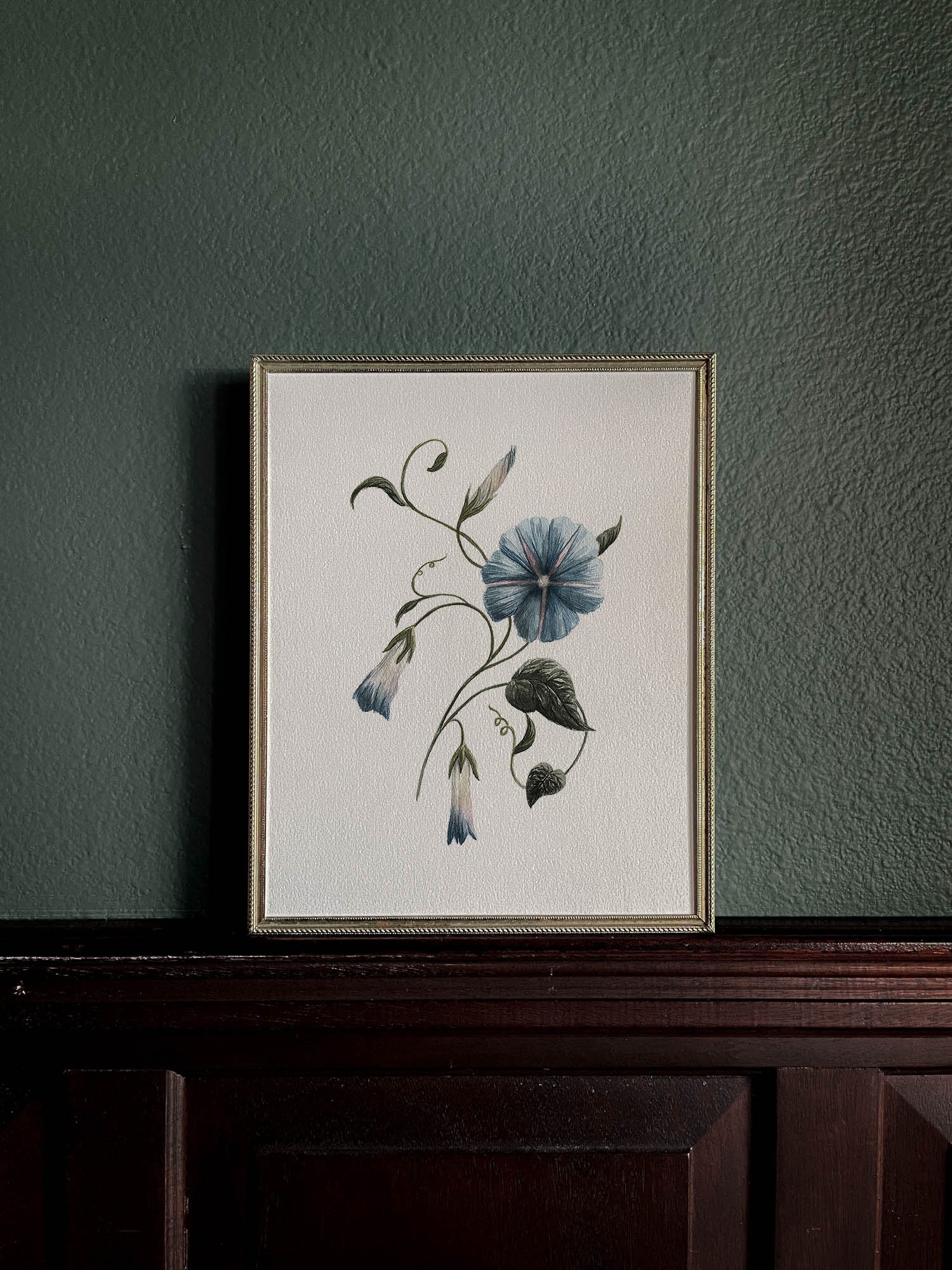15 Skin Beautifying Botanicals: Watercolor paintings for a local spa
I’ve long believed in the healing power of nature. When you step outside and tickle all of the senses you’re lifted out of your body and stretch deeply into the world around you. Nature has a therapeutic effect on the soul and the individual specimens that make up the natural world can do wonders to heal the body. When I was approached by local spa owner Cindy Rodriguez of Bodyworks of Perdido Key here in Pensacola about painting a commission for their space, I knew I wanted to highlight this connection between nature and wellness.
For the three watercolor paintings, we focused mainly on their favorite organic skin care ingredients. Stonecrop took center stage as it’s the main ingredient in the majority of the products they use on a daily basis. On either side of the Stonecrop painting, I created botanical “wreaths” that wove together many of their other favorite herbs and botanicals. This interwoven composition is also a visual meditation as your eyes follow the sinuous plant forms across the paper. It’s a perfect calming exercise for the guests awaiting treatments.
Scroll below to see the details of each painting as well as the beneficial skincare properties of each botanical ingredient.
Interested in commissioning a painting?
Please note that this is not medical advice. Consult with a doctor, licensed esthetician, and/or herbalist before using any of these ingredients. Many of these botanicals and herbs can have severe side effects if used improperly.
Aloe
Aloe Vera
The interior gel of Aloe vera has a cooling and soothing effect when used as a topical ointment. It’s also anti-inflammatory, moisturizing, full of vitamins, minimizes scarring on wounds, and makes the skin more pliable and smooth. It can treat conditions such as acne, fungal infections, rosacea, eczema, and even bug bites. Aloe is also used as an oral laxative, to regulate hypertension, and to treat angioedema.
Arnica
Arnica Montana
Arnica is anti-inflammatory and antiseptic and is often used to soothe aches. Often Arnica used to treat soreness or bruising is prepared as a lotion or fresh poultice. Its properties also lend it to being used to sooth acne, rosacea, and insect bites, and decrease puffiness.
Blueberry
Vaccinium spp
We all know that blueberries are PACKED with antioxidants that can help prevent aging and fight free radicals but blueberries can be used topically to improve the condition of your skin. Blueberry extract is pro-retinol, boosting your collagen. Vitamin-packed, the extract can nourish your skin to enhance your “glow” aka hydrate, and reduce the appearance of pores. The antioxidants also reduce inflammation and increase circulation and moisture.
Arnica, Blueberry, Jasmine, and Watermelon intermingling in the watercolor.
Chamomile
Matricaria recutita
Chamomile is not just a wonderful mild sedative but it is also anti-inflammatory, reduces fever, and can ease an upset stomach. In skin care, it’s often used to treat eczema, acne, and psoriasis. Chamomile’s antimicrobial properties aid in wound healing and its antioxidant properties make it useful for treating inflammation and redness caused by rashes and burns. The herb’s astringent and brightening properties also treat hyperpigmentation and brighten light-colored hair. Chamomile can also help reduce the appearance of fine lines as It protects against free radicals allowing the body to increase cell and tissue regeneration.
Echinacea and Lemons
Echinacea
Echinacea purpurea
All of our knowledge about Echinacea comes from the Native Americans who used the beautiful herb “topically for many conditions, including burns, swelling, snakebites, infections, wounds, toothaches, and sores.”1 Echinacea is also useful for increasing skin hydration and reducing fine lines. Other uses for echinacea include boosting the immune system to shorten an infection.
Elderberry
Sambucus canadensis
The flowers and berries from this plant have a whole range of medicinal properties as well as uses in skin care. The effects are anti-inflammatory, toning, and soothing burns, eczema, psoriasis, insect bites, and hives. Like Blueberry, Elderberry is high in antioxidants and fights free radical stress in the body which causes premature aging. The anti-inflammatory properties can also help with joint pain, tendinitis, and fibromyalgia. If that’s not enough, Elderberry also boasts antiviral properties that help increase immunity and fight infection.
Hibiscus
Hibiscus sabdariffa, Hibiscus acetosella
AKA the “Botox Plant” Rich in Vitamin C the plant increases collagen production and “It has antioxidants that maintain elastin in the skin by decreasing the activity of elastase, which breaks down the protein in the skin.”2 The mucilaginous quality of the Hibiscus also increases hydration. Bonus if you want a tasty, medicinal tea grow Roselle Hibiscus sabdariffa or Cranberry Hibiscus Hibiscus acetosella. This is what gives Starbucks’ Passion Fruit Tea its delicious tang and magenta coloring.
Jasmine
Jasminum officinale, Jasminum sambac
Jasmine is useful for treating acne because of its antiseptic, antibacterial, antifungal, and antiviral properties. It also helps balance moisture in your skin and the better hydrated your skin is, the less acne-contributing oil it produces. The intoxicating scent of Jasmine relaxes and soothes easing stress and anxiety and can also be used as an aphrodisiac. Rub a little Jasmine oil on your skin at bedtime or drink Jasmine tea to take advantage of its sedative properties and drift off into a carefree sleep.
Lemon
Citrus limon
Lemons are packed with antioxidants and Vitamin C which reduce sun damage and premature aging. It can help to temporarily tighten pores and fade acne scars and sunspots. Lemon also brightens skin but any product using lemon also increases photosensitivity increasing your chance for a sunburn so don’t forget the SPF.
Lemongrass
Cymbopogon citratus
Lemongrass is not just a tasty culinary ingredient but also boasts antimicrobial and antiseptic which can treat athlete’s foot and acne. Used in skin care products the essential oil reduces oiliness and controls shine. Make tea from the fresh leaves and use it as a toner to detoxify and purify the skin. Lemongrass also aids in digestion, relieves cramps, and can help relieve fever and flu. Plant Lemongrass out on your patio and run your hand through it to activate the essential oils in the leaves for a natural insect repellent.
Rosemary
Rosmarinus officianalis
Rosemary oil’s antibacterial properties and non-comedogenic nature make it a great acne-fighting aid. Naturally astringent, Rosemary oil tightens and reduces the appearance of pores. It’s also full of powerful antioxidants that help fight premature aging. Its diuretic properties flush out excess fluid, making it a great ingredient for chasing away puffy under-eye bags. Rosemary oil also stimulates the lymphatic system to flush out toxins related to cellulite.
Stonecrop
Sedum spp.
Stonecrop’s skin revitalizing properties in hydrate and moisturize similar to Aloe vera. Its soothing properties reduce redness and calm itchy skin. Stonecrop’s antioxidant properties brighten the complexion and over time can reduce the appearance of fine lines and dark spots.
Sage
Salvia spp.
Sage leaves are antiseptic, antimicrobial, astringent, and antispasmodic. This herb is great for loose, wrinkled, or oily skin and will restore youthful elasticity.
Strawberry
Fragaria ananassa
Like most berries, Strawberries are high in antioxidants which help fight premature aging. The salicylic acid in Strawberries helps fight hyperpigmentation and dark spots. Vitamin C brightens skin, helps regulate oil production, and can help soothe acne. Strawberries can also be used to help reduce inflammation around the eyes.
Watermelon
Citrullus lanatus
Just ingesting watermelon has wonderfully hydrating effects on the body, skin not excluded. Watermelon is cooling and anti-inflammatory helping to soothe acne, burns, rashes, and the like. High in antioxidants, it’s a powerful ingredient for fighting premature aging. The presence of Vitamin A in Watermelon helps balance and control oil production.
Resources
https://www.medicalnewstoday.com/articles/aloe-vera-for-face#conditions-it-can-treat
https://www.ipsy.com/blog/arnica-benefits-for-skin
https://roccoco.com/blogs/blog_posts/the-benefits-of-blueberry-extract-in-skincare
https://www.healthline.com/health/beauty-skin-care/chamomile-benefits-for-skin#types-of-chamomile
https://pubmed.ncbi.nlm.nih.gov/20384903/ : Yotsawimonwat S, Rattanadechsakul J, Rattanadechsakul P, Okonogi S. Skin improvement and stability of Echinacea purpurea dermatological formulations. Int J Cosmet Sci. 2010 Oct;32(5):340-6. doi: 10.1111/j.1468-2494.2009.00559.x. PMID: 20384903.
https://wildernorthbotanicals.com/blog/beauty-benefits-of-jasmine/
https://www.100percentpure.com/blogs/feed/important-rules-for-using-lemon-on-skin#
https://www.vogue.in/how-to/content/natural-skincare-and-haircare-masks-benefits-of-hibiscus-flowers
https://epicuren.com/blogs/news/7-unbelievable-rosemary-oil-benefits-for-your-skin
https://www.myglamm.com/glammstudio/benefits-of-strawberry-for-skin
https://www.myglamm.com/glammstudio/watermelon-benefits-for-skin
1,2 Blankespoor, Juliet. The Healing Garden. Mariner Books, 2022.
Orr, Stephen. The New American Herbal. Clarkson Potter/Publishers, 2014.











